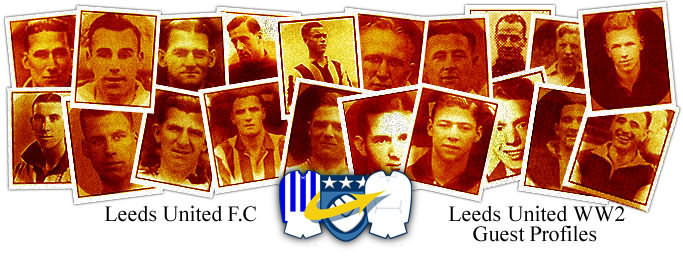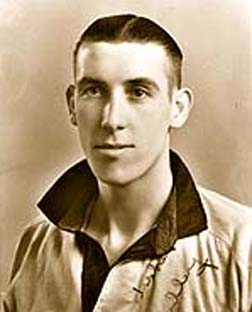

Galley: Thomas (Tom)
WW2 Guest: 1943-1944
(Leeds United War-time Guest Player Details)
Right Half
Born: Hednesford, Staffordshire: 04-08-1915
Debut v York City (a): 20-11-1943
Height & Weight: Unknown
Galley started his career with Cannock Town and was on the books of Second Division
Notts County in the 1933-34 season before being signing for First Division Wolverhampton
Wanderers in April 1934 by Major Frank Buckley. He made his debut as a Centre Forward on 5th
January 1935 in a 0-0 draw against Sunderland at Roker Park. He was not rushed into the
first-team but was introduced gradually at Inside Right as Wolves were not going very well
at the time and had the threat of relegation to deal with. He scored his first goal in the
6-1 romp against Chelsea at Molineux on 22nd April 1935 and finished the season with one
goal from six appearances. He was in the Right Half spot for most of the next season but
reverted to Inside Right in the 1936-37 and 1937-38 seasons when he scored thirteen and
eleven goals respectively. Wolves were runners-up in 1937-38 and 1938-39, as Galley was
ever-present, mostly at Right Half, and scored eleven goals, missing out by one point to
Arsenal and four points to Everton respectively. They were equally close in the F.A. Cup as
they reached the final in 1938-39 only to go down 4-1 to Portsmouth with Galley having to
settle for a losersí medal as he now featured at Right Half. The aspirations of Galley and
Wolves were put on hold as World War Two brought the Football League fixtures to a halt. He
had scored thirty-six goals in one hundred and forty-two League appearances and four goals
in seventeen F.A. Cup games. He had been capped by England at Inside Right in Oslo in a 6-0
victory over Norway on 14th May 1937 in which he had scored Englandís third goal and this
was soon followed by another cap, again at Inside Right, in Stockholm in a 4-0 win over
Sweden three days later. Like many other footballers of his day there is little doubt that
he would have received more Caps except for the Second World War. He did represent the
Football League against the Scottish League at Molineux on 2nd November 1938 as the Scots
were beaten 3-1. In the Second World War he joined the Royal Artillery and served in France
and Germany and while he stayed with Wolves through the War years he also guested with
Aldershot, playing twice in 1943-44, Watford, where he scored five goals in thirty-one
appearances in 190-41 and twice in eight games in 1941-42 and Leeds United. With Leeds he
played at Right Half in the 1943-44 Football League Northern Section, making his debut in a
3-1 win at York City and then returned three weeks later to play in consecutive home games,
against Halifax Town, which was won 4-0, and Huddersfield Town, which saw United go down 0-3
in the First Championship competition. He was back for just one game in the Second Championship
when he was in the team that went down 1-3 to Sheffield United at Bramall Lane on 4th March 1944.
With Wolves, in 1939-40, he scored three times in twenty-five appearances, 1941-42 twice in ten
games, 1942-43 he scored twice in fourteen, 1943-44 he didn't score in seven games and in 1945-46,
he scored once in fifteen games. Galley did also appear in the 1942 Football League War Cup Final
at Centre Half in both Legs of the Two-legged Final as Wolves drew 2-2 at Roker Park on 23rd May
1942 and then a week later at Molineux they triumphed 4-1 over Sunderland to take the Cup on a
6-3 aggregate for Galley to receive his only winnersí medal. After the War Galley returned to
Wolves and scored five more goals in forty-one League games, in the Right Half role and also
scored four F.A. Cup goals in four appearances before joining First Division Grimsby Town in
November 1947. In both spells while at Molineux he had scored forty-one goals in one hundred and
eighty-three League games, plus three more in the aborted 1939-40 season, while in the F.A. Cup
he had scored eight times in twenty-one games. Playing as Centre Half and Captain, he was unable
to help the Mariners stave off relegation and he finished his Football League career at Blundell
Park playing in the Second Division, when injury forced him to stop playing at Football League
level. He scored twice in thirty-two League games and also played one game in the F.A. Cup
before dropping into Non-League football with Kidderminster Harriers and finished as player-coach
with Clacton Town until he retired from football in 1960. In retirement he lived in his native
Hednesford and died in 2000.